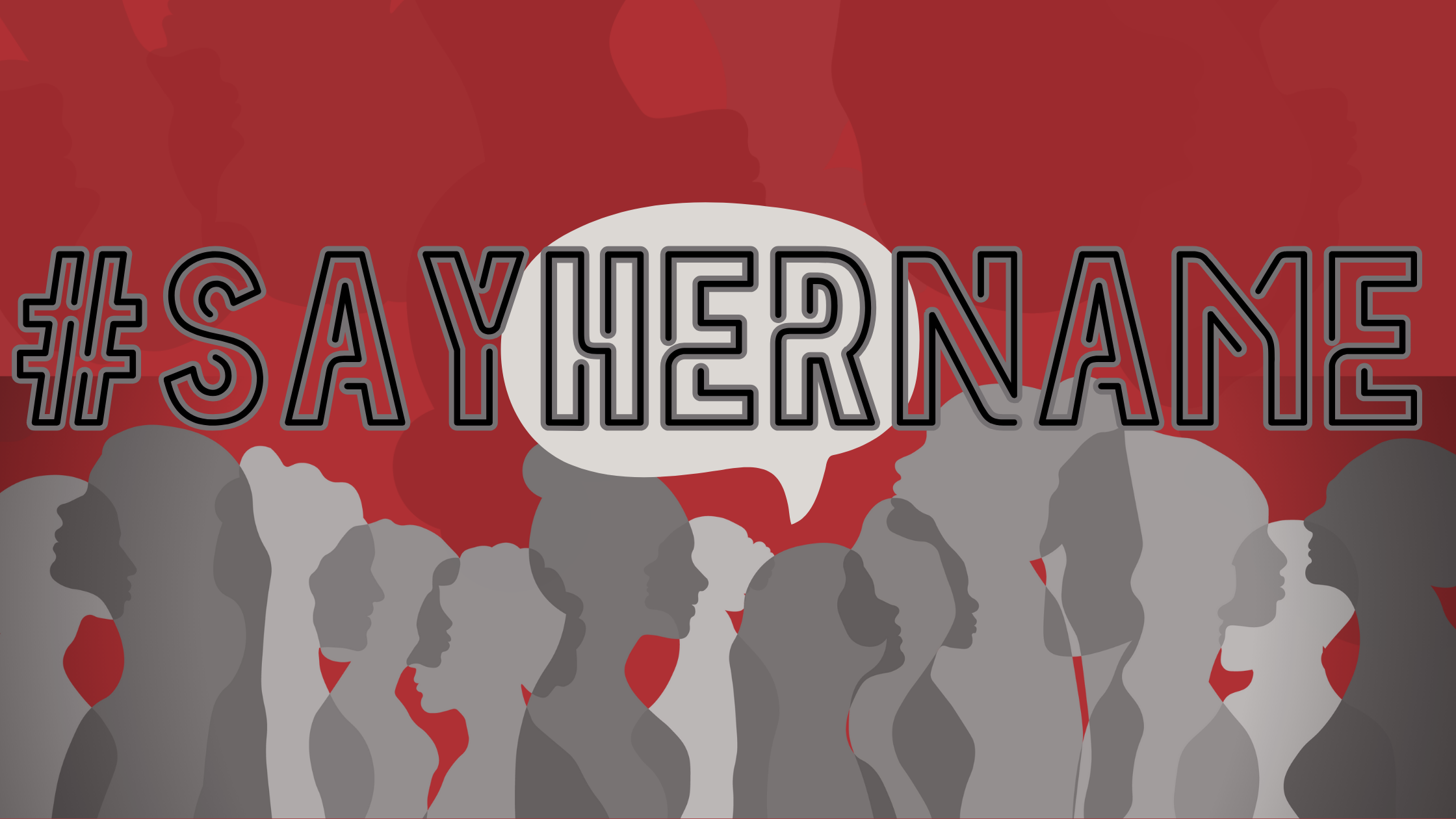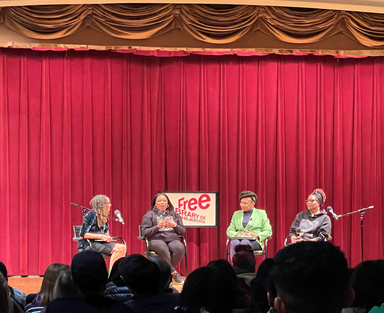
By: Azsaneé Truss
While the audience went to Kimberlé Crenshaw’s October 14th Author Event at the Parkway Central Free Library expecting a book talk, what we experienced was more of a vigil: an honoring of the lives of the more than 200 Black women, girls and femmes murdered by the police whom Crenshaw profiled in her latest book, #SayHerName: Black Women’s Stories of Police Violence and Public Silence. Emceed by Penn sociology and law professor Dorothy Roberts, the George A. Weiss University Professor, the event featured song, brief readings from the book, conversation with mothers of women murdered by the police and, most prominently, the ritual of Saying Her Name(s). The event was unexpectedly therapeutic, reminding myself and many others in the audience why we do the types of scholarly, activist and artistic work we do.

While Kimberlé Crenshaw is best known for her theoretical interventions within critical race theory (having co-named this domain) and Black feminist scholarship, this book speaks directly to her activist praxis. While #SayHerName does provide “an analytical framework for understanding Black women’s susceptibility to police brutality and state-sanctioned violence,” the book also tells the stories of several Black women and femmes lost to police violence and explains how storytelling and ritual have acted as both healing and galvanizing forces for affected communities.
After an introduction by Roberts, the event began with a few opening words from Crenshaw. Crenshaw spoke of how Black women’s deaths do not spark protests in the way Black men’s do; while the police murders of Black men and boys have rightfully galvanized people across the country —and as seen in 2020, the world— the widespread killings of Black women “have yet to be memorialized in widespread activations and denunciations.” This points to how integral an understanding of intersectionality —a term which Crenshaw herself coined— is to stopping police violence.
The audience then heard from three mothers from the #SayHerName Mothers Network, a collective of family members of Black women killed by the police. This aspect of the event was one of several enactments of Black feminist praxis which took place throughout this event, utilizing the time, space and audience to humanize and memorialize the women in this book, as opposed to simply theorizing their deaths. We both heard of the reparative practices Crenshaw writes about in #SayHerName and experienced them.
The first dramatic reading was by Margaret Odette, who spoke in the voice of Valerie Carey. Valerie Carey is the sister of Miriam Carey, a mother and dental hygienist who was killed by law enforcement officers on October 3, 2013, in Washington, D.C. On that night, Miriam drove through an unclearly marked police checkpoint, unarmed and with her 1-year-old daughter in the back seat. Within seven minutes, six secret service agents had fired eight rounds into her car and two capitol police officers nine rounds. Though Miriam didn’t survive, her daughter did and is now eleven years old. Valerie (via Odette) reminisced about Miriam being so chubby as a baby that their father nicknamed her “Butterball,” recalled enjoying hanging out with her sister as teenagers and remembered being in her office on a Thursday when she turned on CNN and learned of her sister’s killing.
The next storyteller was Kim Yancey who spoke as Rhonda Dormeus, mother of Korryn Gaines. Gaines was 23 years old at the time of her death, described by her mother (via Yancey) as feisty, outspoken, an avid reader, and an excellent student who often questioned the status quo. She was killed on August 1, 2016, in her home in Randallstown, Maryland, as officers sought to serve her a warrant for an earlier traffic violation. After police forced their way into her home, there was an armed standoff between Gaines and police, ultimately ending in her being shot and killed by a Baltimore County Police Officer. Her five-year-old son was shot by police in the crossfire but survived. Though the family and estate of Korryn Gaines were awarded a large sum in a settlement, her mother “can do without the dollars, [she] wants accountability —[she] wants the people involved to be held accountable” and for “them to feel our pain.”
The final reading was by performer Rosslyn Coleman, giving voice to Gina Best. Best is the mother of India Kager, who was killed by police on September 5, 2015. On this day, Kager was driving from Maryland to Virginia Beach with her partner, Angelo Perry, and their 4-month-old son, Roman. They stopped at a 7-Eleven, where a SWAT team threw a flash bang grenade and opened fire after having tailed the car planning to arrest Perry. Four officers fired over 51 rifle rounds into India’s car, killing Angelo and India within seconds. Baby Roman survived but is now deaf in his left ear because of the grenade and dealing with nightmares and behavioral issues because of the trauma. Gina Best has a collection of windchimes and tells Roman that their tinkling noises are the sound of his mother visiting them.
Following these readings, composer, activist, scholar and Sonic Conceptualist Performing Artist Abby Dobson shared two songs with the crowd. During the first song, Professor Crenshaw led the audience through the ritual of Saying Her Name(s). The audience stood, and she read the names of over 20 Black women who have been killed by the police, directing the audience to Say Her Name(s) three times after reading it. This call-and-response was an expression of collective grief, a ritual of resistance and an affirmation that these women’s lives mattered.
The event closed with a brief Q&A session with both Crenshaw and the family members whose stories had been shared, moderated by Roberts. The audience asked questions about how folks can support the #SayHerName Mothers Network, about the role of law in meaningfully changing what law often authorizes and about how intersectionality allows us to expand our tools for survival to Black girls and women. Leaving the event, I can imagine that the rest of the audience shared in my feelings of grief, hope, rage, empowerment, catharsis and care. Bearing witness to these women’s stories, participating in the act of Saying Her Name, holding space for the realities of police violence against Black women provided us with the space to go beyond a discussion of the contents of the book and instead embody the reparative practices Crenshaw and the #SayHerName Mothers Network have designed.

